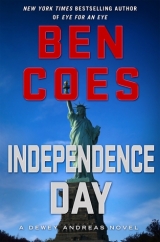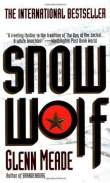
Текст книги "Independence Day "
Автор книги: Ben Coes
Жанры:
Боевики
,сообщить о нарушении
Текущая страница: 22 (всего у книги 28 страниц)
78
NATIONAL ARCHIVES
WASHINGTON, D.C.
The helicopter swooped low through the nation’s capital, coursing along the National Mall and then banking left and hovering for a moment before descending toward the roof of the National Archives building.
Calibrisi looked at Katie and Tacoma. He handed Katie a thick green card the size of a business card.
“His name is Stoddard Reynolds,” said Calibrisi. “Give him this. You’ll need it to get in the room.”
“What is it?”
“That card gets you entrance into certain places during times of national crisis,” said Calibrisi.
“Is that the one for getting on the doomsday plane?” asked Tacoma.
“Don’t lose it. I’ll be at the White House. Call me if you find anything.”
Katie opened the chopper door and climbed out, followed by Tacoma. The blue Sikorsky shot up into the sky as Katie and Tacoma walked toward a man standing at roof’s edge.
“You must be Reynolds,” said Katie loudly, above the sound of the helicopter.
“Follow me.”
They rode an elevator to the basement of the building, then followed Reynolds down a long corridor. A stairway went two stories lower. After another long corridor, they came to a large steel door.
“Swipe the card,” said Reynolds.
Katie held the card over a digital scanner. A second later, they heard the steel locks clicking. A green light appeared above the door.
Reynolds reached for the latch and pushed it open, then pointed.
“Go ahead,” he said.
“Are you coming?”
“No, I don’t have access. I’ll be waiting right here when you’re done. You need to lock it from the inside.”
As they entered the vault, fluorescent lights went on. Tacoma shut the door, then locked it.
The room was massive, at least a hundred feet long and equally wide. For the most part, it was empty, like a library that has been shut down and cleaned out. Only in the center of the room was there anything to see. There, steel filing cabinets ran in a straight line. There were thirty in all.
Katie and Tacoma approached the cabinets. Each five-foot-tall cabinet held four drawers. The cabinets weren’t labeled.
Tacoma came to the first cabinet and pulled out a drawer, then reached inside and removed a thick black manila folder. On the cover of the folder, words were typed:
OPERATION TRIANGLE 14
Tacoma opened the folder and started reading.
“Motherfucker,” he whispered.
“What is it?”
Tacoma kept reading, but didn’t answer. After a minute, he shut the folder, then put it back in the cabinet and slammed it shut.
“What was it?” she asked.
“Nothing,” he said quietly.
“Rob—”
“It was Cairo,” said Tacoma. “A year ago. Remember Bill Jarvis?”
“Yeah, sure. He was station chief for a while, before he got killed in a car accident.”
“It wasn’t an accident,” said Tacoma. “We did it. These are the termination files.”
“Meaning what?”
“When we have to take down an agent. These are the end-of-action reports.”
Katie nodded, then started walking down the line of cabinets. She found a cabinet that interested her and pulled out the top drawer.
“These are completely unorganized,” said Katie. “We could be here awhile.”
She looked back at Tacoma, who was still standing at the first cabinet.
“Don’t be so naïve,” she said.
“Don’t you want to know what happened? Like to Rodney? Haven’t you ever wondered?”
“No, I haven’t,” said Katie. “Shit happens. Look at where we are. What did you think these were? Now start looking.”
79
SITUATION ROOM
THE WHITE HOUSE
The Situation Room was crowded with the president’s top military, homeland defense, and national security team, including Vice President Donato, the seven members of the Joint Chiefs of Staff: the chairman and vice chairman of the Joint Chiefs, the Army chief of staff, the commandant of the Marine Corps, the chief of naval operations, the Air Force chief of staff, and the chief of the National Guard Bureau. Also present were key cabinet members and Agency heads: Calibrisi; Defense Secretary Harry Black; National Security Advisor Josh Brubaker; Tim Lindsay, the secretary of state; George Kratovil, director of the FBI; Arden Mason, secretary of homeland security; Piper Redgrave, director of the National Security Agency; Martha Blakely, the secretary of energy, and John Wrigley, the secretary of commerce.
A variety of key White House and Pentagon aides were also present, including Chief of Staff Adrian King, Bill Polk and Josh Gant from Langley, and Mark Raditz, the deputy secretary of defense.
The walls were covered in a dazzling array of plasma screens. On one wall, several screens displayed photos of the ocean as Defense Intelligence Agency satellites swept for the remote possibility of spotting the boat as it crossed the high seas. Another wall showed a large three-dimensional digital map of the U.S. East Coast, with small lights representing, in real time, all U.S. naval, military, and law enforcement assets and their current positions. A screen at the far end of the room showed live feeds of news media: Fox, CNN, ABC, CBS, NBC, Al Jazeera, BBC, and Russia SkyView, monitoring for any mention of the bomb or terror plot.
On the wall just inside the door was a clock. In red digital letters, it displayed a countdown of time remaining until 12:01 A.M. on July 4.
Outside the room, down the hallway, just past a pair of soldiers with submachine guns, President J. P. Dellenbaugh was standing. He was alone, waiting outside the door. His hand was on the wall and his eyes were shut as he steadied himself and tried to find strength.
Dellenbaugh had just finished the last of the phone calls to the parents and, in two cases, spouses of the six dead CIA men. Telling them they died doing something they believed in. That they died protecting the United States of America.
It was Dellenbaugh’s first crisis as president. He’d been a U.S. senator when 9/11 occurred. His memory was permanently scarred by the sight of flight 77 crashing into the Pentagon.
This threat, he knew, was worse. If the nuclear bomb were detonated on U.S. soil, the casualty count would be in the hundreds of thousands, perhaps more. The psychological scars on individuals, on children and families, on schools and communities, on government, on America itself would be impossible to heal.
Dellenbaugh kept his eyes shut for more than a minute, praying silently. Then he stepped into the room. Conversation ceased. Every man and woman in the Situation Room stood up and saluted him. At this moment, he was the commander in chief.
“Harry, where are we on finding the boat?” asked Dellenbaugh, taking his seat at the head of the table.
Black hit the remote. A screen cut to a map of the Atlantic Ocean.
“The boat passed through the Strait of Gibraltar three days ago,” he said.
A bright red rectangle appeared on the plasma above a section of ocean. At the top of the screen, Greenland and Iceland were visible to the north.
“Based on our estimates of the boat speed, tides, that sort of thing, we believe the terrorists are somewhere within this band of ocean.”
“What’s the bottom line?” asked Dellenbaugh.
“They’re less than two days out, sir.”
Dellenbaugh turned to Brigadier General Phil Tralies, chairman of the Joint Chiefs.
“General?”
“We’re throwing everything we have at it, Mr. President,” said Tralies, pushing his glasses up on his nose. “We have every long-range UAV we can spare searching for the boat, based on the description of the vessel, estimates of when it passed Spain, and assessments of shipping channels, tide, weather, and of course the speed of the vessel. We have an active interagency protocol that is now live-wired across the U.S. defense and intelligence infrastructure. We’re also coordinating with NATO, Interpol, and all major shipping lines that do business with the United States.”
Black hit the remote. Another screen cut to a photo of a fishing trawler.
“This is what the boat looks like,” said Black. “Approximately two hundred feet long, aft wheelhouse, made to fish in deep water. Unfortunately, there are about half a million of these floating around the Atlantic Ocean right now. And therein lies the challenge of finding it.”
“Not to mention the truly scary thing,” added Tralies, “which is they might’ve switched boats by now, in which case we have a bigger problem.”
Black tossed the remote across the table to Raditz.
“DIA satellites are scouring that rectangle of ocean,” said Raditz. We’re snapping photos at a rate of one thousand per second, sweeping in a controlled arc that we hope will locate the boat.”
Raditz pointed to the screens behind him, showing a rapidly changing series of close-up photos of the sea.
“That’s the digital feed. We have a lot of people looking at it and, perhaps more important, it’s being run against some pretty sophisticated analytical software programs at NSA.”
“Have we seen anything?” asked Dellenbaugh.
“We’ve identified twenty-four boats matching the description,” said Raditz. “They were all legit.”
“How do we know they’re legit?” asked Dellenbaugh.
“We ask for papers, then run them against various registration and commercial filings,” answered Raditz. “We also run an interrogation protocol designed to quickly identify possible suspicious behavior and separate those folks from the rest of the pack. We’re coordinating those interviews, as they occur, with interrogators from Langley. We also run the audio through lie detectors. If anyone looks suspicious, we will board.”
Dellenbaugh stared at the screen—photo after photo of black ocean, interrupted occasionally by whitecaps.
“And if we don’t find it while it’s out at sea?”
Raditz handed the remote to the man on his left, Rear Admiral Henry Turner, chief of naval operations.
“We’re building a cordon off the East Coast,” said Turner. “That’s a military and law enforcement resource line up and down the coast. Subs, ships, boats, planes, and on-the-ground personnel. Obviously, we’re placing particular emphasis on cities and populated areas. We’re working with Homeland to coordinate communications with state and local law enforcement so we’re not panicking at the eleventh hour.”
“What about a blockade?” asked Dellenbaugh. “Why can’t we just shut the damn coast down?”
“Theoretically we could attempt it, sir,” said Turner. “We’ve war-gamed it. But there are a couple of very significant challenges. First, we’re talking about thousands of miles of coastline. Based on the volume of boats out there versus our enforcement capability set—hardware, manpower—a smart ship captain is going to get through. If we focus on two or three cities, odds are they won’t get through; they’ll simply go to city number four, five, six. Or they’ll wait us out. We believe the best strategy is what we’re doing—a flexible line of defense with transparent vertical coordination down through the military and law enforcement complex.”
Dellenbaugh was silent for a dozen seconds. Then he turned back to Tralies.
“General, what are the odds we find this thing?”
Tralies nodded, considering his words.
“Normally I’d give it a twenty-five percent chance,” he said. “But…”
“But what?”
“The vessel has moved very quickly across a challenging navigational course. This suggests an experienced ship captain. He knows what he’s doing. That, for me at least, lowers the odds.”
“How low?”
“One in ten, sir.”
Dellenbaugh paused. He reached forward and poured a cup of coffee, then turned to a woman with long blond hair, seated at the far end of the table: Martha Blakely, the secretary of energy, whose agency was responsible for building America’s nuclear weapons arsenal.
“They needed explosives from the Vietnamese boat,” said Dellenbaugh. “What does that tell you, Martha?”
“Sir, this sort of nuclear bomb needs conventional explosives in order to trigger the nuclear reaction,” said Blakely. “Presumably, their nuclear expert opened up the bomb and found that the explosives were somehow compromised or degraded.”
“How hard is it to replace them?”
“Not very hard, Mr. President. There’s a chance they’ll fail, but it’s small.”
Dellenbaugh looked at Calibrisi.
“What about intelligence, Hector?”
“We know who’s behind the plot, which is a significant first step,” said Calibrisi. “Now we’re just trying to find him.”
Calibrisi nodded to the plasma. The map of the U.S. eastern seaboard was replaced by a tile of photographs, six in all. They were all photos of Cloud.
The key elements of Cloud’s biography appeared:
NAME:
VARGARIN, PYOTR ALIAS(ES): “CLOUD”
DOB:
1980 (est.) BIRTHPLACE: Sevastopol, Ukraine
1980–85
Undocumented
1986–93
St. Anselm by the Sea, orphanage (Sevastopol, UKR)
1992
First documented instance of “Cloud”
1994
Enters MSUIEC
1998
First documented attacks involving “Cloud” on computer infrastructure in U.S.
2001
Participates in activities related to 9/11 including manipulating U.S. air traffic control systems in hours leading up to attack
2002
Graduates #1 in university class/various academic honors
2002
Enters graduate school—MIPT—Russia’s top science and technology institute
2007
Earns master of science degree with highest honors
#1 in class of 1,312 students: GPA 4.33
2008
Indictment in absentia by Switzerland DOJ
2008
Indictment in absentia:
U.S. DOJ
Russia MOJ
China MOJAF
2009
Achieves grand master status following victory at Russia National Chess Championships
2010
Ph.D. with highest honors
Pushkin Prize for Highest Academic Achievement
“You’ve already seen this, everyone,” said Calibrisi, “so we don’t need to waste time rehashing Cloud’s bio. Let me cut to the chase. We believe he’s in Moscow. We’re doing everything we can to find him. It’s a game of hide-and-seek.”
“What do you have on the ground in Moscow?” asked Dellenbaugh.
“Right now, we have two operators and a case officer.”
“Is that enough manpower?”
“No, and we’re doing everything we can to build a bigger team.”
“Did we have anything to do with the events that are on the news?” asked Lindsay, the secretary of state.
“That depends.”
“On what?”
“On what events you’re talking about, Tim.”
“You know damn well what I’m talking about. The abduction of the ballerina.”
“Yes.”
“I’ve been on the phone four times with the Russian foreign minister.”
“How’s he doing?” asked Calibrisi.
Lindsay shook his head, slightly exasperated.
“He’s pissed,” barked Lindsay. “We could’ve run this through the Russian foreign ministry. We could have—should have—flown over there and sat her down and talked to her, official channels.”
“I doubt that.”
“Why do you doubt it? Do you think he’s lying? We need to work with the Russians, Hector. And I’m not talking about the Russian mafia. My God, what has Langley gotten us into?”
Calibrisi nodded, then glanced at Rickards, the attorney general, who had obviously shared the Malnikov deal with Lindsay and others.
He took a deep breath.
“It was your State Department that led the negotiations regarding the disposition of nuclear materials after the Soviet Union imploded,” said Calibrisi. “It was Russia’s foreign minister who claimed, as recently as last month, that all Soviet-era nuclear materials and weapons were accounted for and safeguarded. This bomb was one of those weapons. If you’d like to play Monday-morning quarterback, I’d start by looking in the mirror.”
“I was a United States senator when those deals went down—”
“So it’s not your fault?” asked Calibrisi. “Is that what you want us all to know?”
“How dare you—”
“We’re in the real world now, Senator,” said Calibrisi, interrupting. “In that world, a nuclear bomb is on its way to the United States. In that world, a terrorist succeeded in penetrating Langley’s computer networks and killing six American soldiers. I will do everything in my power to stop that bomb from detonating on American soil, including working with people like Alexei Malnikov. You had to take some angry phone calls? All I can say to that is, stop your whining and either start pitching in or get out of the way.”
Lindsay, face beet red, lurched forward in his chair. But Dellenbaugh held up his hand, telling him to keep quiet.
“Enough,” said the president.
“But Mr.—”
“I said enough. If you two want to take it outside, that’s fine with me.”
The president was silent for several moments as he took control of the room. He looked at Lindsay.
“I authorized the Malnikov deal,” he said, before turning to Calibrisi. “And I was in the Senate when the Soviet Union broke up and we paid lip service to the warnings by Mossad about their nukes. So I guess if you two want to blame someone, you can blame me.
“When I was on the Red Wings, I could always tell when we weren’t going to win the Stanley Cup. It was during those seasons when guys would start pointing fingers at each other in the locker room after we lost a game.
“I would trade my life to stop that bomb, and I expect each of you feel the same way, regardless of your title, your rank, or your beliefs. If you don’t, I want your resignation right here, right now. If that bomb goes off, our country will be forever, permanently scarred. Hundreds of thousands of people, maybe millions, will die. We have to stop that bomb. There is no other option.”
80
VERNACULAR HOUSE
POBEDY PARK
MOSCOW
“Ty v poryadke?”
The words intermingled with at least a dozen screeching car alarms and sirens in the distance.
How long he’d been unconscious, Dewey didn’t know. He was on the ground. There were several people kneeling over him. Everything was cloudy and blurry.
“Ty v poryadke?” repeated the man leaning over him, asking Dewey if he was all right. He placed his hand on Dewey’s forehead.
Dewey pushed the man’s arm aside, then climbed to his feet. He looked to where the car had been. Then he turned. Flames and smoke billowed from up the block. Vernacular House was gone. The buildings on either side were rubble. The cars in front of the house were on fire.
Weaving, Dewey started to move back toward the explosion. He pushed through a line of bystanders, knowing the agents inside were dead yet needing to get back there. As he reached the corner, the first police car arrived, followed by several fire trucks.
Dewey moved up the sidewalk toward the safe house, delirious with shock, his head concussed. He pulled out his cell phone. The glass was shattered. When he tried to turn it on, nothing happened.
He felt for his gun. It was gone.
Dewey turned back toward where he’d landed on the ground.
A woman was pointing at him. She was speaking to a police officer who, Dewey could see, was holding the gun. The officer yelled something in Russian. Dewey turned again. He continued toward the safe house, now blocked by a pair of police cars, their blue and red lights flashing through the rain. He registered two policemen climbing from the first cruiser, looking in his direction.
Dewey turned again. The first officer—the one with Dewey’s pistol—was sprinting toward him.
He turned yet again. The two officers from in front of the safe house were also running toward him, weapons out and raised.
He was hemmed in.
Dewey cut abruptly left, away from the two converging lines of policemen.
They were yelling at him, barking at him in Russian, telling him to stop. But he kept moving.
Dewey ran, limping, still weaving, toward a side street, as the officers closed in on him.
He reached the corner of the side street. A block away, he saw lights from a passing car. Suddenly, the car stopped, paused, then jacked right, directly toward him, bursting up the street at high speed.
Dewey heard a gunshot from behind him as the low red sports car ripped up the cross street directly for him. Dewey kept running as the car flew down the thin lane. At the last second, the driver of the car swerved left and slammed the brakes, just feet away. Dewey heard yelling from inside the car. He went to the open passenger window and looked in.
The muzzle of a gun was aimed at him.
“Duck,” the man said.
Dewey moved down just as the driver fired. The bullet struck the closest policeman in the head, kicking him to the ground two car lengths away.
“Get in,” came the thick Russian accent inside the sports car.
Dewey climbed in as gunfire erupted from behind him.
“Hold on.”
The driver put the car in reverse and slammed the gas, tearing backward as, with his left hand, he fired his gun at the line of policemen now charging on foot. The car sped backwards up the street. When the mag was spent, he dropped the gun. In one fluid motion, he jacked the wheel and with his other hand pulled the emergency brake. The car flipped one-eighty. He released the brake, then slammed the gas. Soon he had the car speeding away from the scene, moving rapidly away from the chaotic scene.
“You must be Dewey,” he said as he steered without looking up. “I’m Alexei Malnikov. Welcome to Moscow.”








